The 21 Stories that Shaped 2021
Ossoff, Warnock elected senators, clinch Democratic control of Congress

U.S. Sens. Jon Ossoff (D-Ga.) (right) and Rev. Raphael Warnock (D-Ga.) (left) bump arms.
By Matthew Chupack
Jan. 6, 2021
Democratic victories swept the Jan. 5 Georgia U.S. Senate runoffs as Sen. Jon Ossoff (D-Ga.) overcame former Sen. David Perdue (R-Ga.) and Sen. Raphael Warnock (D-Ga.) defeated former Sen. Kelly Loeffler (R-Ga.). With their wins and Vice President Kamala Harris casting the tie-breaking vote, Democrats reclaimed a narrow Senate majority for the first time since 2014.
Warnock became the first Black senator from in the state’s history and the first Democratic Black senator from the South. He was also the first Black senator sworn into office since Harris in 2017.
Ossoff became Georgia’s first Jewish senator. He was also the youngest Democratic senator since President Joe Biden in 1973.
Hear how Professor of Political Science Alan Abramowitz broke down these historic victories on Wheel Talk.
Emory community largely denounces pro-Trump insurrection

Virginia Brown (23C) was interning at the U.S. Capitol when pro-Trump rioters broke in. (Virginia Brown)
By Caelan Bailey
Jan. 7, 2021
Virginia Brown (23C) was on the floor of the senate for her internship as a chamber assistant when pro-Trump supporters led the insurrection at the U.S. Capitol on Jan. 6 in in an effort to prevent the certification of the Electoral College for then-President-elect Joe Biden. Brown was forced to hide alongside members of Congress, Capitol staff and journalists after rioters broke into the building, leading to the deaths of five people.
University President Gregory L. Fenves called the violence “antithetical” to American ideals in a Jan. 6 tweet and several faculty members in the political science department signed an open letter from political scientists calling for the removal of Trump from office.
Hear more about Brown’s experience in the Senate chamber when insurgents stormed the Capitol on Wheel Talk.
The desegregation of the Wheel: A work in racial reckoning and reconciliation
By Brammhi Balarjan, Shreya Pabbaraju and Ben Thomas
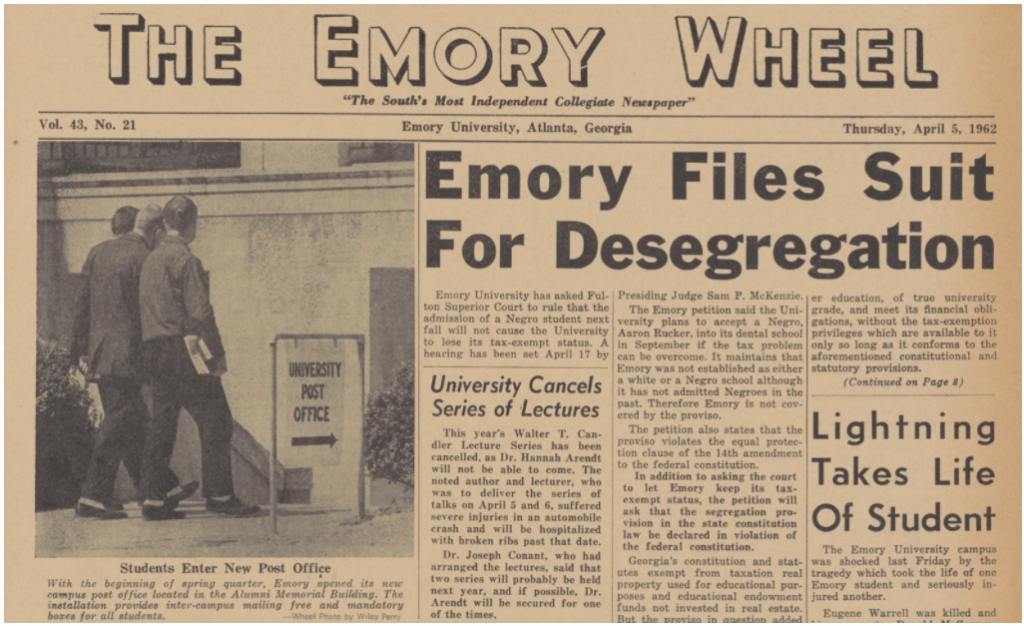
April 5, 1962. The Wheel reports that Emory has sued to permit its integration. Courtesy of the Rose Library.
Feb. 10, 2021
In 1963, Emory College admitted its first Black student. Drawing on this turning point, the Wheel’s Opinion section compiled “1963,” an investigative project that emphasized how desegregation continues at Emory and traced past and persistent inequities at Emory and the Wheel.
This piece detailed the history of diversity and inclusion in the demographic make-up of the Wheel, the paper’s work environment and how the Wheel covered various topics, such as objectifying women and its anti-war stance.
Through talking with numerous past Wheel reporters and editors, from students who graduated in 1966 to current undergraduates, Brammhi Balarjan, Shreya Pabbaraju and Ben Thomas found that the Wheel reported a white-centered point of view, an issue still affecting the organization today.
Hear more about the 1963 project and how the Wheel’s coverage played a role in desegregation on Wheel Talk.
Sundance Film Festival 2021: The experience of a lifetime

Clare Kendry (Ruth Negga) and Irene Redfield (Tessa Thompson) develop an uneasy friendship in ‘Passing.’ (Sundance Institute)
By Saru Garg
Feb. 12, 2021
Despite being a full-time college student living over a thousand miles away from Park City, Utah, then-Arts & Entertainment Editor Saru Garg attended the 2021 Sundance Film Festival in its virtual setting.
As an accredited member of the press, Garg watched film premieres, went to live Q&As with filmmakers and interacted with critics from around the world. In this piece, Garg reflected on three films she saw at Sundance: “Passing,” “Together Together” and “CODA.”
Biden, Harris visit Emory, respond to spa shootings in speech
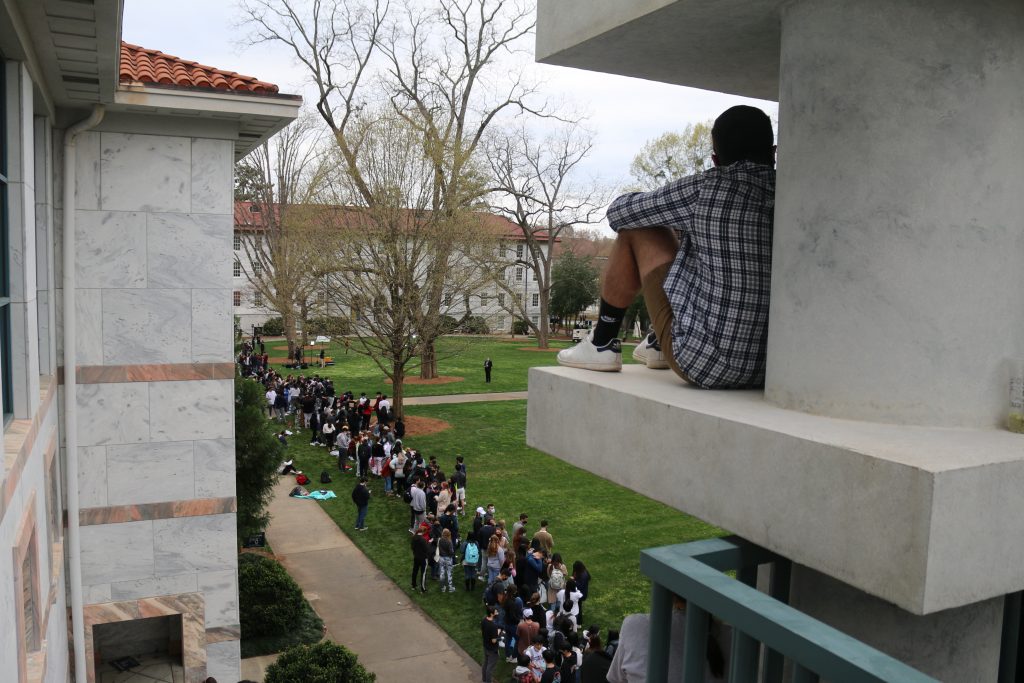
Students gathered on the quad outside of Convocation Hall, where President Joe Biden gave a speech on March 19 condemning the Atlanta spa shootings. (Isaiah Poritz)
By Matthew Chupack and Sarah Davis
March 24, 2021
After eight East Asian women were tragically killed at three Atlanta spas on March 16, President Joe Biden and Vice President Kamala Harris visited Emory University on March 19, where Biden condemned the hate crime in a speech in Convocation Hall. Hundreds of students gathered on the Atlanta campus quad hoping to catch a glimpse of the president or vice president, to no avail. Additionally, at least two students led a protest on the quad, holding signs that read “Abolish ICE.”
“Hate can have no safe harbor in America,” Biden said in his March 19 speech. “It’s on all of us, all of us together to make it stop.”
‘I’m Exhausted’: Emory Community Addresses Anti-Asian Hate

A 21-year-old killed eight people across three spas in the Atlanta area, six of whom were Asian women, on March 16 (Isaiah Poritz).
By Anjali Huynh
March 24, 2021
The Atlanta spa shootings on March 16 follows a long history of Asian women being mistreated in the U.S. and a spike in hate crimes against Asian Americans propelled by the pandemic. The Emory community reflected on the massacre.
“People have been talking about this for years, and there have been multiple cases of anti-Asian racism dating back to when Asian Americans first started immigrating to the U.S.,” said Jane Wang (22C), co-chief of staff for the Emory Asian Pacific Islander and Desi American Activists (APIDAA). “It’s really frustrating to not see our issues pushed to the forefront until people are getting killed.”
Hear Executive Editor Anjali Huynh (22C) discuss Asian American violence and discrimination and Chief of Digital Operations Cailen Chinn (22C) reflect on being an Asian American woman from Boulder living in Atlanta following massacres in both places less than a week apart on Wheel Talk.
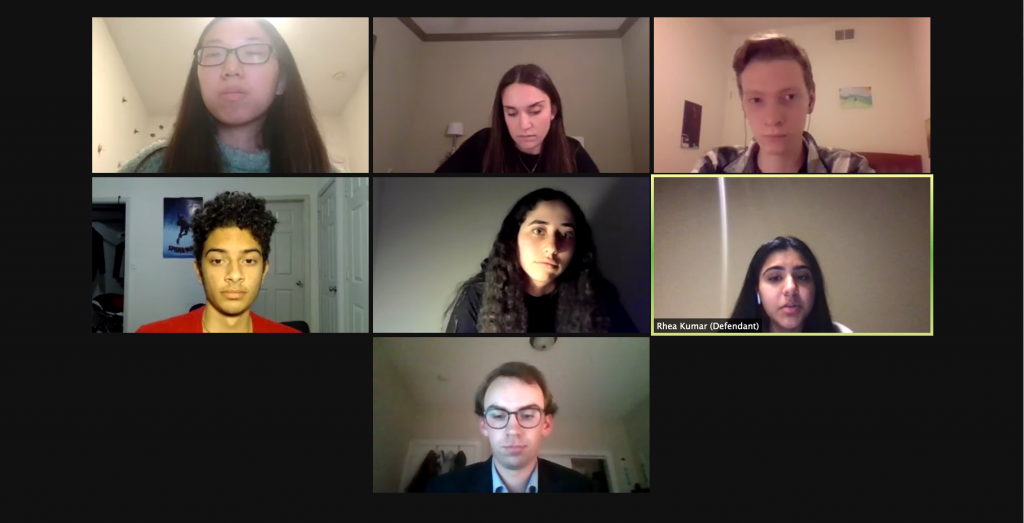
The SGA hearing for the Park v. Steffel et. al case occurred over Zoom on April 13.
By Tanika Deuskar and Jareer Imran
April 13, 2021
Following weeks of turmoil over the 2021 Student Government Association (SGA) elections, the Constitutional Council delivered a unanimous opinion on Park v. Steffel et al., siding against the defendants. The Council found that then-SGA President Lori Steffel (21B) and then-BBA Council President Emily Ferguson (21B) violated the Code of Elections by endorsing SGA presidential candidate Rhea Kumar (22B) and vice presidential candidate Nick Paschetto (20Ox, 22B) while serving as members of the Board of Elections.
Finding that Kumar and Paschetto violated Part V Article 3 of the Code, the Council ordered a second Spring 2021 election without Kumar and Paschetto on the ballot. The Council also found that then-BBA Council Vice President-elect Katie Lee (22B) engaged in voter intimidation and violated both the Elections Code and the SGA Constitution, recommending impeachment proceedings against Lee.
School of Medicine offers formal apology to Dr. Marion Hood

Dr. Marion Hood received a plaque from President of the Student National Medical Association Sydney Williams in “recognition of his tenacity and resilience in the quest to be a physician.” (Sarah Davis)
By Sarah Davis
June 19, 2021
Emory School of Medicine Dean Vikas P. Sukhatme delivered an apology on June 17 on behalf of the school to Dr. Marion G. Hood for denying him consideration for admission to the school on the basis of race in 1959.
“I apologize for the letter you received in 1959, in which you were denied consideration for admission due to your race,” Sukhatme said. “We are deeply sorry this happened, and regret that it took us more than 60 years to offer you our sincere apologies.”
The School hosted a conversation with Hood in Convocation Hall to apologize for its past discrimination and to present him with a plaque in recognition of the path he took to becoming a physician.
“I did not expect to get into Emory,” Hood said. “I did not expect the letter to be on the internet. If you go to my house, that letter is framed in my basement where only my friends go. It’s not in the front of my house anywhere where anybody coming can see the letter.”
Emory to rename Longstreet-Means Hall, build memorials honoring enslaved laborers
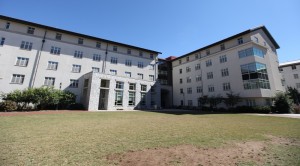
Photo by Jason Oh
By Matthew Chupack and Anjali Huynh
June 28, 2021
Emory renamed Longstreet-Means Residence Hall to Eagle Hall following the University Committee on Naming Honors’ in-depth review of various campus building namesakes and calls from students over the years to acknowledge the namesakes’ racist histories. Former University President Augustus Baldwin Longstreet, who the hall was named after, was a slave owner and slavery apologist.
The committee found that Longstreet “used his platform as Emory’s president to promote pro-slavery views,” Fenves wrote, making it “inappropriate for his name to continue to be memorialized in a place of honor.”
Oxford College’s Language Hall will be renamed to honor Horace J. Johnson Junior, a former judge on the Alcovy Circuit of Georgia.
The University will also construct memorials on both the Atlanta and Oxford campus to commemorate the enslaved people who helped build the University. The Twin Memorials Working Group is currently drafting and disseminating proposal requests to architectural firms.
Emory to require vaccines for all faculty, staff

The university will require that all students are fully vaccinated against COVID-19 for the fall 2021 semester. (Creative Commons/ SELF Magazine).
By Matthew Chupack and Ninad Kulkarni
July 27, 2021
The University expanded its COVID-19 vaccination mandate to all University faculty and staff, with possible exemptions granted to individuals with medical exemptions or strong personal objections, Fenves announced in a July 27 email.
The vaccine requirement followed a petition organized by Professor of History Clifton Crais, calling on the University to require vaccines for all faculty and staff. Crais noted that he was not consulted about the decision and only informed about the updated policy minutes before it was released.
By Oct. 14, the University restricted vaccine exemptions to only individuals “approved medical reasons” or “sincerely held religious beliefs,” Executive Director for COVID-10 Response and Recovery Amir St. Clair wrote.
Following the emergence of the Omicron variant, St. Clair announced on Dec. 16 that the University would also require booster shots for students, faculty and staff ahead of the spring semester.
Gone for gold: Emory alum wins at Tokyo Olympics

Andrew Wilson (17C). Courtesy of Emory Athletics
By Sophia Himmel
Aug. 7, 2021
Andrew Wilson (17C) brought home a gold medal for Team USA in the 4×100-meter men’s medley relay team at the Tokyo Olympics on July 31. Wilson is the first former Emory athlete to participate in the Olympics and also the first male Division III swimmer to ever qualify. Wilson had to delay his dreams after the Olympics were postponed after the start of the pandemic until 2021. His win is now a momentous fixture in Emory’s sports programs’ history.
Wilson received a gold medal for helping the team reach the finals in the preliminaries. Wilson walked away having competed in three Olympic events, making it to the finals for the men’s 100 breaststroke. This makes Wilson the first Emory Eagle and Division III swimmer to win a gold medal at the Olympic Games, leaving Japan with plenty to celebrate.
Emory student’s debut novel brings more Black Muslim representation to young adult literature
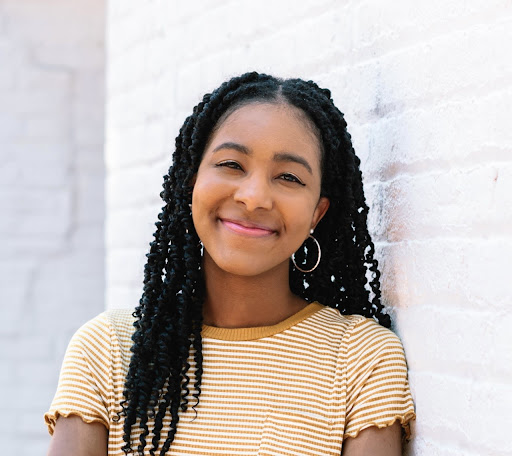
Laila Nashid (23C) poses for her official author headshot. (Nohelia Valentin)
By Allison Reinhardt
Sept. 8, 2021
After bearing witness to the impact of COVID-19 and political polarization in her hometown, Washington, D.C., Laila Nashid (23C) wrote and published her novel “You Truly Assumed.” The fictional story follows three Black Muslim teenagers who create a blog to connect with one another in the face of anti-Muslim discrimination. The book will be available for purchase in stores on Feb. 8, 2022.
“I think the biggest thing that I want people to take away is that there’s no one way to make change,” Nashid said. “Because ‘You Truly Assumed’ follows three different point of view characters, they’re all bringing different perspectives to the blog, and they’re all making change in different ways. There is no right way to really do activism; you can make change the way that makes sense to you.”
Emory opens first Asian affinity space
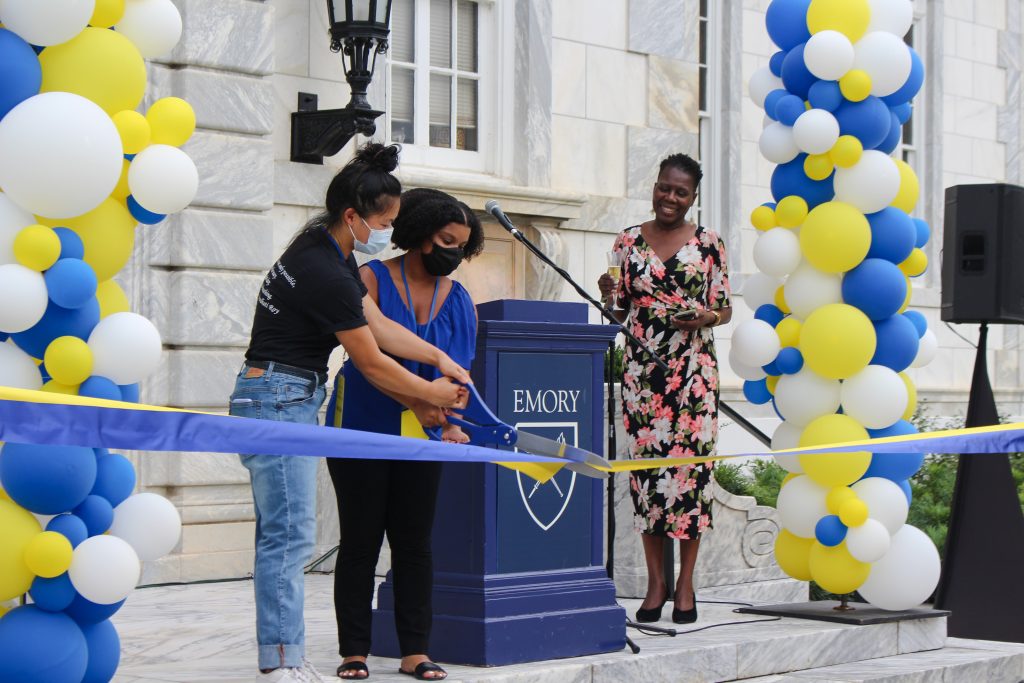
Emory unveils its first Asian identity space. Photo by Ally Hom
By Ulia Ahn
Sept. 21, 2021
Emory University opened its inaugural Asian Student Center on Sept. 8. Located on the first floor of the Alumni Memorial University Center, the hub remains the only space at the University dedicated to Asian students and part of Emory’s Identity Space Project. Asian students first proposed the creation of the center to University administrators in 2019.
“I now have a space that affirms my identity, a home on campus,” Stephanie Zhang (22C), a member of the student group that advocated for the Asian Student Center, said. “This is a product of the activism of Asian American students on campus who found they did not find a safe space or one with specific resources.”
Emory issues land acknowledgement ahead of symposium, Indigenous People’s Day
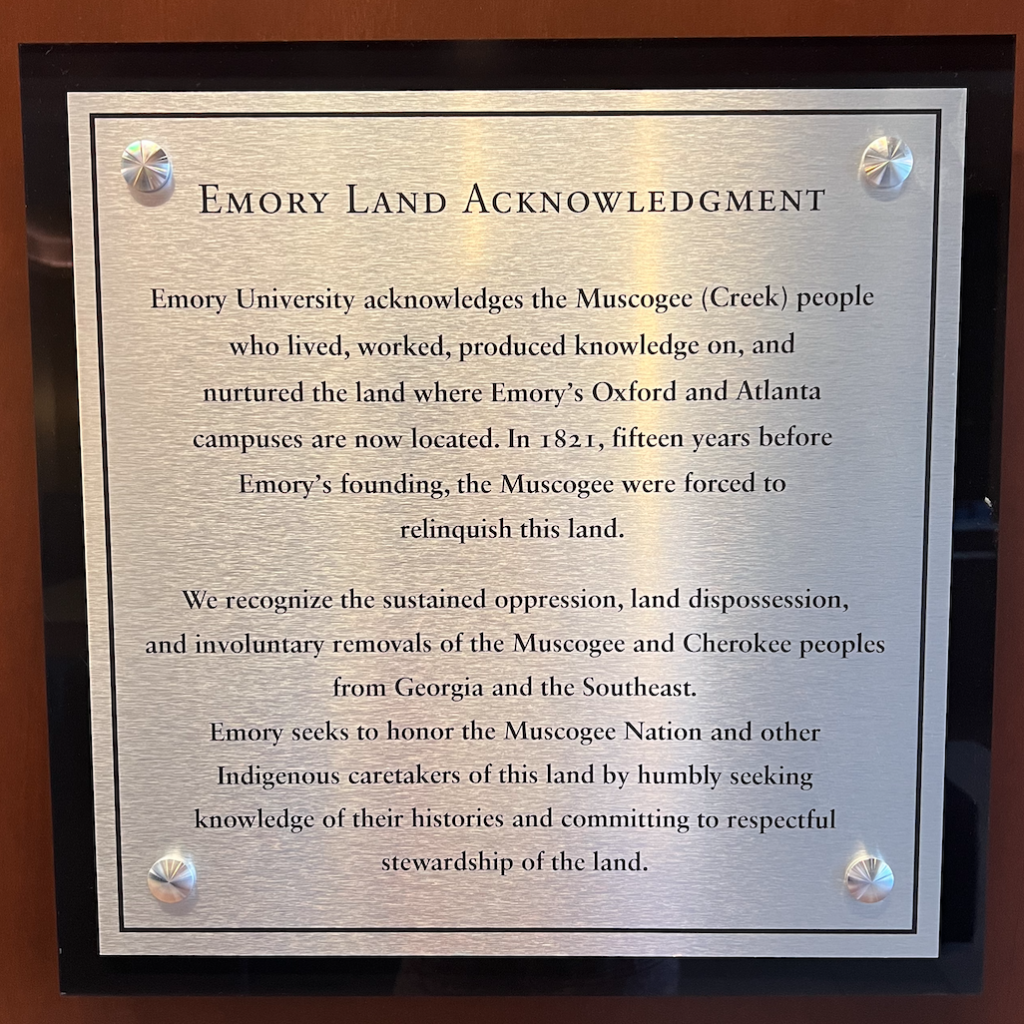
Emory’s land acknowledgement plaque (Courtney Wiethorn/Contributing Photographer).
By Sarah Davis
Oct. 6, 2021
The Board of Trustees approved a statement on Sept. 27 that acknowledged the Muscogee (Creek) people who lived on the land where Emory University’s Oxford and Atlanta campuses stand today and the displacement of these people in 1821, 15 years before the University’s founding. The statement came prior to the University’s “In the Wake of Slavery and Disposession” symposium which held a series of events from Sept. 29 to Oct. 1 addressing the University’s historic role in the enslavement and displacement of Black, Indigenous and Native peoples.
New provost says he will prioritize diversity, ‘student flourishing’
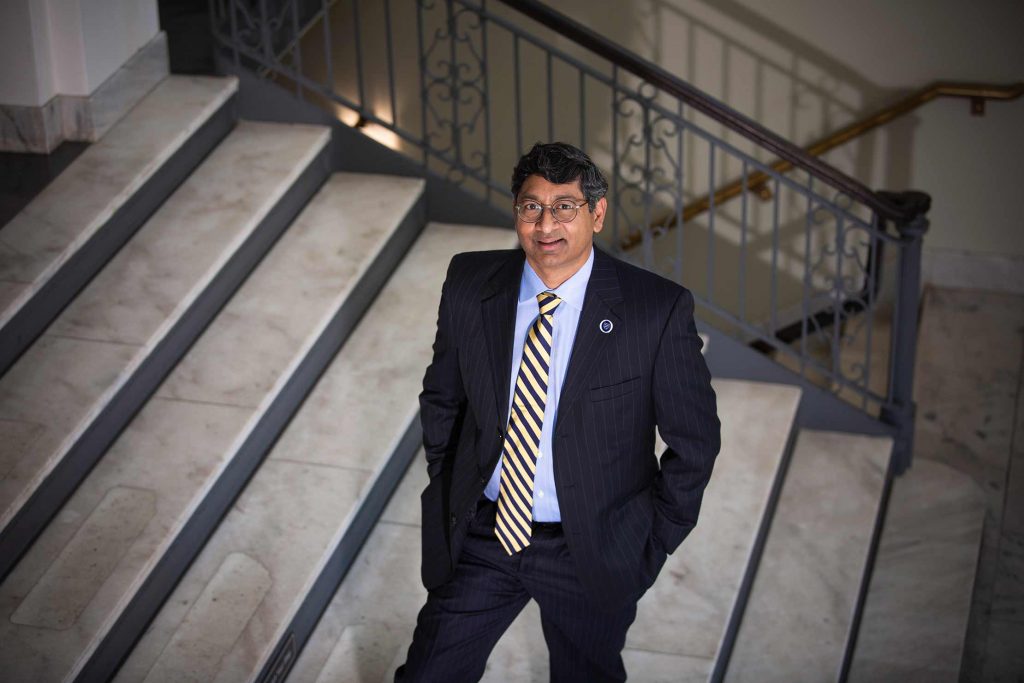
Provost Ravi Bellamkonda. Photo Courtesy of Emory University
By Matthew Chupack
Oct. 6, 2021
Emory named former Dean of the Pratt School of Engineering at Duke University Ravi Bellamkonda was named the new provost and executive vice president for academic affairs on Feb. 16. The Wheel sat down with Bellamkonda in the fall to talk about his goals in the next position. Bellamkonda shared his mission to make the University “accessible to the best students, broadly defined, from anywhere in the world…” and to increase faculty diversity.
“Sometimes people pose diversity and excellence as opposing things, which I think is a cop out,” Bellamkonda said. “I think if you are serious about excellence, you are serious about diversity.”
Jack Harlow highlights Homecoming, but Fetty Wap doesn’t show

Jack Harlow performs at the 2021 Swoop’s Ball.
By Matthew Chupack and Uma Shenai
Oct. 20, 2021
Student Programming Council (SPC) selected Grammy-nominated rappers Fetty Wap and Jack Harlow to headline the 2021 Homecoming concert, the first on-campus concert in two years. Nearly three hours after attendees entered McDonough Field, SPC President Thomas Heagy (22B) told the crowd that Fetty Wap missed his flight to Atlanta and would not perform.
“Like everyone else, I was pretty disappointed,” Areej Memon (23Ox) said. “But also, I think it’s pretty funny that he missed his flight. It makes for a fun story to tell.”
Following the concert, the Emory Police Department (EPD) received an anonymous complaint of sexual battery that occurred at the concert. The EPD incident report stated that an anonymous first-year female student told the University’s Campus Security Authority that “she was fondled by an unknown male student” while attending the concert.
JPEGMAFIA celebrates his birthday and the birth of ‘LP!’ at the Masquerade

JPEGMAFIA performs in Canada (2019). (Wikimedia Commons/Levi Manchak)
By Elaine Zhou
Nov. 3, 2021
Barrington Hendricks, professionally known as JPEGMAFIA, performed at the Masquerade venue earlier this fall. The night doubled as his 32nd birthday and the release of “LP!”
Contributing writer Elaine Zhou described the performance as “a conglomeration of distorted glitches, textured bass and jumpy instrumentals, JPEGMAFIA’s avant-garde sound rocketed off of every wall, and dissonance never sounded so heavenly.”

Confetti falls from the sky following the Braves’ World Series celebration at Trust Park. (Michael Mariam/Sports Editor)
By Michael Mariam
Nov. 7, 2021
After the Atlanta Braves won the World Series for the first time in 26 years in a momentous victory against the Houston Astros on Nov. 2, the city of Atlanta erupted in celebration. The team paraded through the city on Nov. 5 into the Braves’ home stadium Truist Park, creating a spectacle that sports editor Michael Mariam wrote would be “cemented in the minds of Braves fans and the city of Atlanta forever.”
Leinweber’s ‘Little Sophomore Girl’ sexualizes students. Fire him.
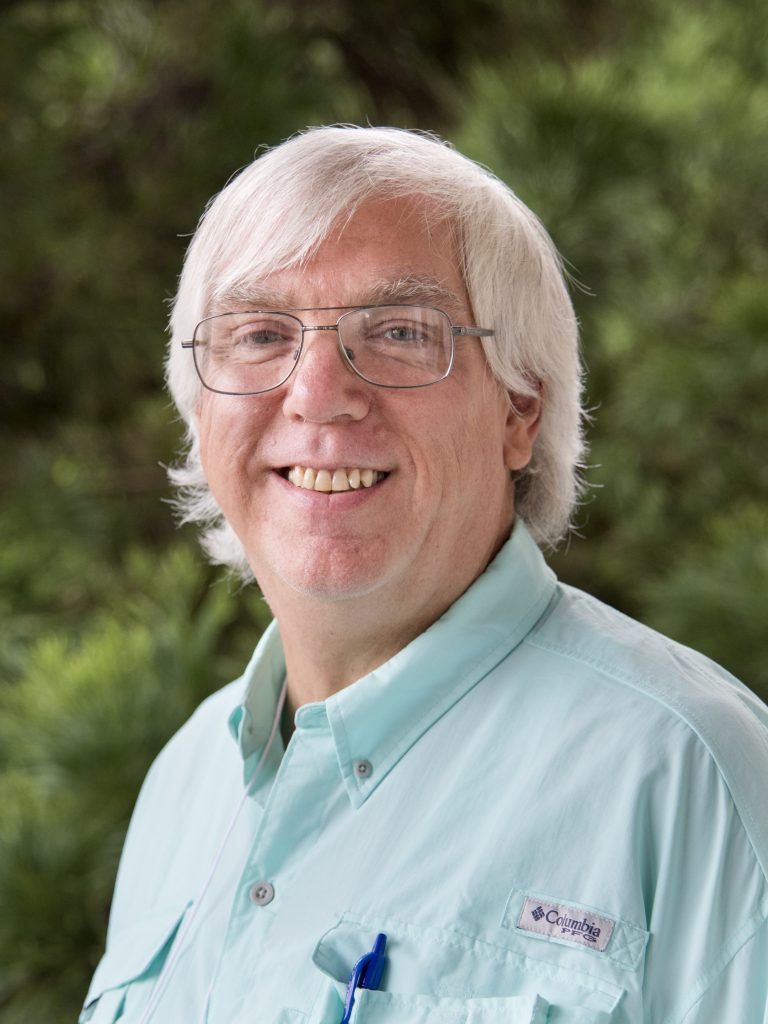
David Leinweber is a Associate Professor of European History at Oxford College of Emory University. (Emory University)
By The Editorial Board
Nov. 16, 2021
Following reporting on students’ continued discomfort with“Little Sophomore Girl,” a song written and performed by Oxford College Associate Professor of History David Leinweber, the Wheel’s Editorial Board called for the professor’s firing. The Board called Leinweber’s song “abject cruelty” because its lyrics tell a story of a professor lashing out at a female student for giving negative course reviews. Oxford College Dean Douglas Hicks called the song “inappropriate and disturbing.” As of the end of 2021, Leinweber remains a faculty member at the College.
Dear President Fenves, here’s what you need to know about mental health
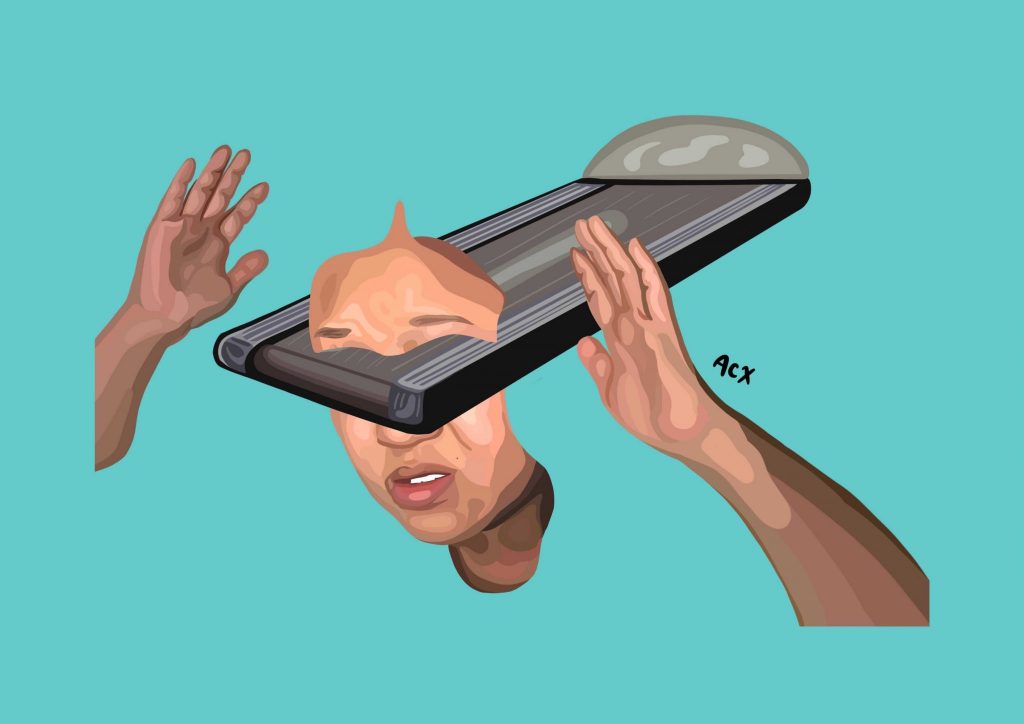
By Sophia Ling
Dec. 1, 2021
In an open letter to Fenves, the opinion editor Sophia Ling addressed the president’s email to students on World Mental Health Day. Ling wrote about the constant strain students feel between staying up to date on coursework and taking care of themselves and the failure of the University to ease this strain and make mental health resources more accessible.
“While counseling services may be helpful for many people, it’s only a temporary solution,” Ling wrote. “The problems of the meritocracy, of overworked and overachieving students toward no tangible goal is still present.”
A classroom divided: how the debate of slurs and academic freedom splintered the law school
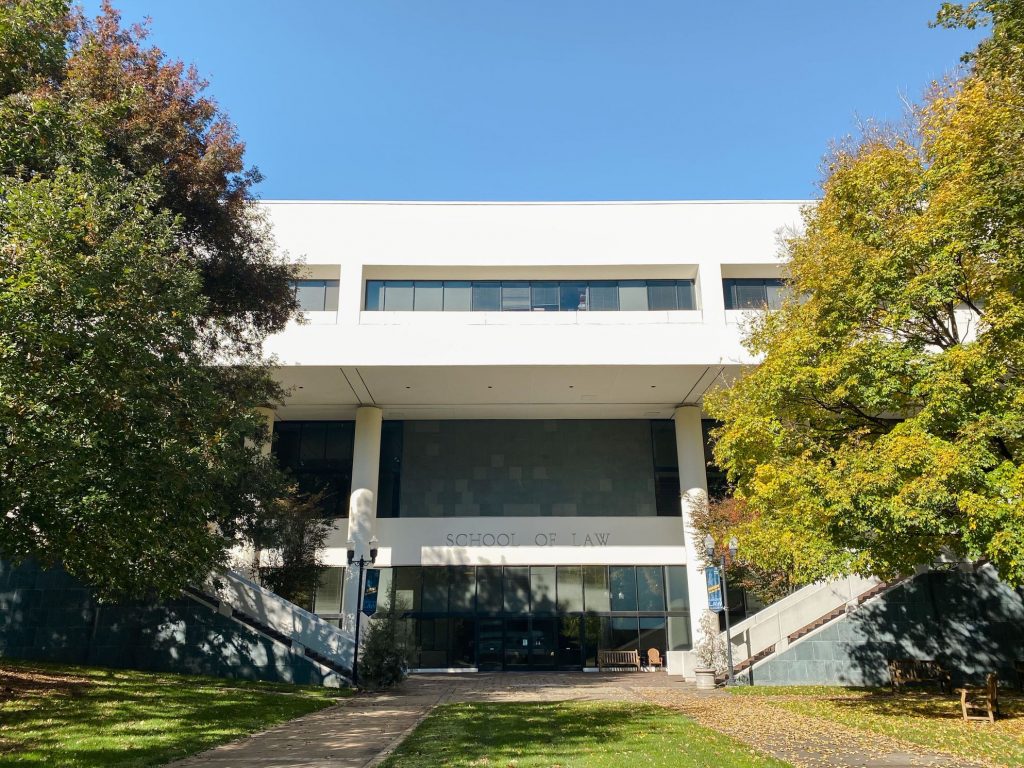
The Emory University School of Law. (Ally Hom/Photo Editor)
By Matthew Chupack and Madi Olivier
Dec. 1, 2021
The Emory Law School has a history of professors using slurs. Since fall 2018, at least four different law professors received backlash for having admitted to saying or having allegedly said the N-word in an academic setting, including in August of the fall 2021 semester. However, it was Associate Professor of Law Alexander Volokh’s use of a homophobic slur during a lecture about the Westboro Baptist Church that reignited the debate on the pedagogical value of using slurs in the classroom.
Hear more about the history of the use of slurs at the law school as well as the recent use of a homophobic slur and its affects on the law school community on Wheel Talk.
Stories summarized by Matthew Chupack and Sarah Davis | Web design by Matthew Chupack

